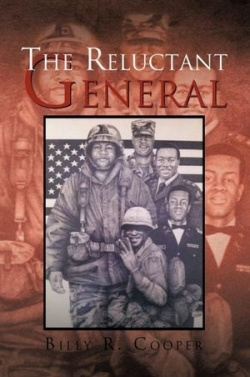The Reluctant General
“I had been all that I could be in the Army,” writes retired Brigadier General Billy R. Cooper, with evident pride and satisfaction, in his memoir The Reluctant General. For this poor, African-American farm boy from Texas, the army was more than a career; being drafted to serve in Vietnam was, as he notes, one of those “miracles” that “are disguised as adversity,” and one that allowed him to realize the American Dream.
Earn it he did. He learned early on that “there is honor in hard work,” and that an education is “the one thing nobody can take away from you.” Through hard work, Cooper attained honors and rank that had once been unavailable to men of his race and background.
Cooper writes honestly and emotionally about his youth, especially of the hardworking grandparents who raised him on a farm with no running water and the mother who later reclaimed him and brought him to Dallas for his teen years. His recollections of growing up black in the segregated South in the 1950s and early 1960s are no less poignant for their similarity to stories told by others of his age group. They make Cooper’s rise from drop out to draftee to general, over the course of thirty-three years, even more dramatic and inspiring.
His march from private’s chevron to brigadier’s star began when a sergeant in boot camp observed that, “Private Cooper, you are never going to be happy as an enlisted man.” Fast-tracked through the “shake and bake” course to sergeant and then onto Officer Candidate School, Cooper was catapulted to the rank of lieutenant in near-record time. And then he was sent to Vietnam. His chapters on the war are perhaps the best in the book, especially the section in which he remembers a fallen comrade. Every time he visits the Vietnam Memorial, he touches that soldier’s name engraved on the dark wall.
Through no fault of his own, the second half of Cooper’s book does not live up to the first half. After Vietnam, his career in the service makes for rather dull reading, save for a whirlwind diplomatic tour of East Africa and the Middle East on the eve of the first Gulf War. Cooper tries to make subsequent tours with peace-time artillery units, research commands, and Pentagon offices interesting, bringing up humorous anecdotes such as the one about the “great Frito incident of 1974.”
While many readers may be tempted to fall away in the latter half of this short work, those who soldier on will come away with a good feeling for the man and his accomplishments. It may not attract a large audience, but, at the very least, The Reluctant General should serve as an inspiration to the author’s children and to anyone who fears that a humble beginning or prejudice will keep them from attaining the American Dream.
Reviewed by
Mark G. McLaughlin
Disclosure: This article is not an endorsement, but a review. The publisher of this book provided free copies of the book and paid a small fee to have their book reviewed by a professional reviewer. Foreword Reviews and Clarion Reviews make no guarantee that the publisher will receive a positive review. Foreword Magazine, Inc. is disclosing this in accordance with the Federal Trade Commission’s 16 CFR, Part 255.

